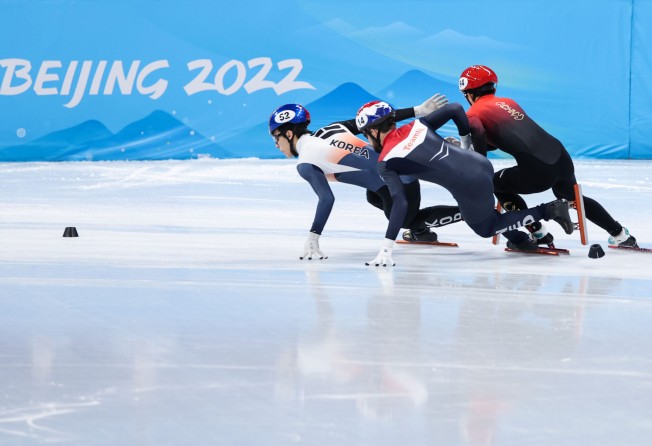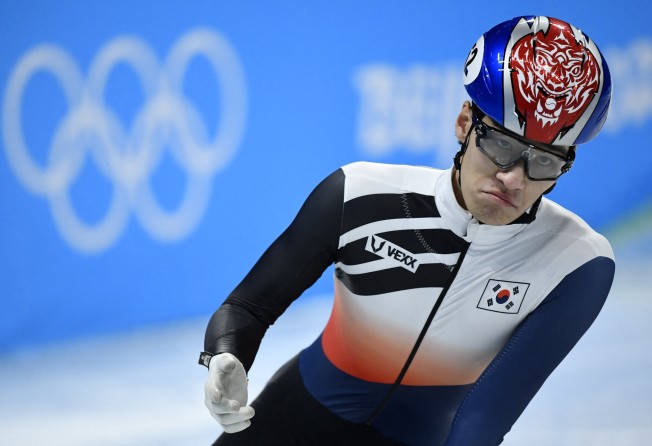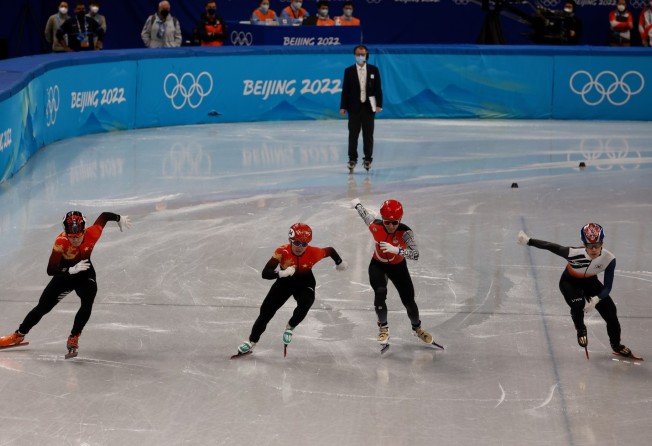
Winter Olympics: Why South Korea is still riled by ‘injustice’ of short-track speedskating loss, what they’re doing about it
- Country’s skaters Lee June-seo and Hwang Dae-heon were disqualified in semi-finals of 1,000m race
- China’s Ren Ziwei and Li Wenlong went on to take gold and silver after benefiting from the decisions

The battle for medals in short-track speedskating might be over on the ice in Beijing, but a row is still brewing over one of the most contentious disciplines at the Winter Olympics.
One of many flash points during the Games came during the men’s 1,000m competition. Skaters fell in every quarter-final race, and not one finished without an athlete being penalised and eliminated.
For the South Koreans, it was devastating. Both of their medal hopefuls, Lee June-seo and Hwang Dae-heon, the world record and Olympic record holder, were penalised and disqualified in the semi-finals.
The wipeout came at a surprise, and now the country has filed an appeal with the Court of Arbitration for Sport (CAS) to try to “make formal the injustice of the race’s outcome”.

Why were Hwang and Lee disqualified?
Hwang took the lead with about three laps left in his semi-final heat, passing two Chinese skaters in front of him, Ren Ziwei and Li Wenlong. The 22-year-old held his lead and crossed the finish line.
But after a review, Hwang was penalised for having made an illegal late pass causing contact and was disqualified. In the second semi-final, Lee was also punished, this time for a lane change that caused contact, and China’s Wu Dajing made the final instead.
Ren and Li went on to take gold and silver, while Hungary’s Shaoang Liu took the bronze home.
What do the rules say?
Rule 297 of the ISU’s governing code says interfering with another skater by crossing their course and thereby causing contact violates race rules.
The responsibility for obstruction or collision is on the skater who overtakes, so long as the skater being passed “does not act improperly”, it says.

What does South Korea say?
Choi Yong-koo, who heads the South Korea short-track support team said in a press conference after the race: “Referees are humans and can make mistakes, but if the mistakes are repeated, they are intentional.”
He said he reviewed the race footage and did not find fault in Hwang and Lee. Instead, he said, Ren tried to overtake Hwang on a corner and made contact with Li.
Choi also said Lee’s pass was legal, and according to him, Hwang pushed Hungary’s Shaoang Liu, who the came into contact with Lee, causing him to fall.
“Based on my analysis, the issues lay with the Chinese skater and the Hungarian skater,” Choi said.
What have South Korea done so far?
The South Korean team have “strongly protested” to the chief referee after the match and sent a letter of protest of the International Skating Union (ISU) and the International Olympic Committee (IOC).
They also filed an appeal with CAS, the sports world’s highest court.
South Korea are not trying to reverse the decision to disqualify Hwang and Lee, but to ensure “such unfair penalties will be prevented from happening again”, South Korea’s Olympic Committee said.
The ISU quickly rejected the team’s protest, and in statement said “the chief referee reviewed the incident once more with the video referee and stands by his final decisions”.

Why did it prompt such a big reaction?
Some in South Korea were riled by the decision. Members of the conservative group Righteous People in South Korea have torn up the Chinese flag near China’s embassy in Seoul because of the 1,000m race.
They said the refereeing was biased and they were angry that the South Korean government did not raise the issue with Beijing.
South Korea were largely expected to win, or at least medal at the event.
The country is a short-track powerhouse and is seen as one of the strongest medal contenders along with China. Expectation for the team was high – its short-track skaters and teams have won a record 24 Olympic gold medals before the Beijing Games.